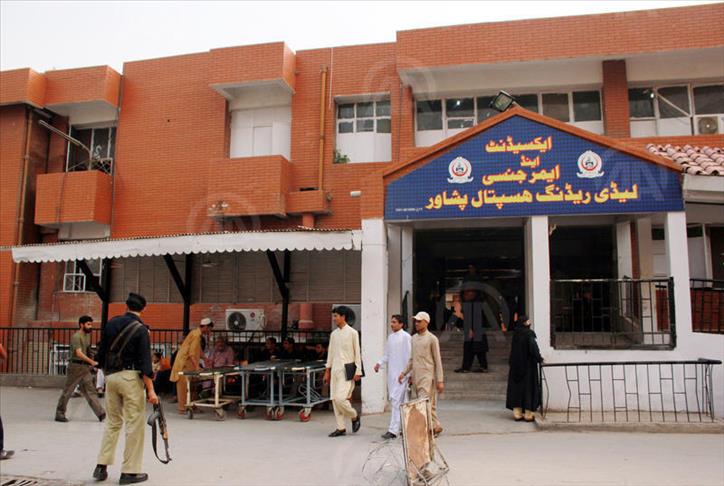
"I don't remember how many injured I have treated the past eight years of my life; how many of them survived and how many did not," Khan told the Anadolu Agency.
"One batch [of injured] is discharged and another is there the next day," added the 28-year-old in his white pants and half-sleeve shirt, the standard dress for a male nurse in Pakistan.
"But it is my duty," he added. "I will proudly continue to do it."
Built in 1924 in the center of Peshawar, the capital city of KP province, the hospital was named after the wife of then Viceroy of India, Lord Reading.
It is the largest and most sophisticated hospital in the province, which borders war-ravaged Afghanistan.
And for that reason, it has been a final destination for between 70 and 80 percent of those injured in terrorist bombings and drone attacks across KP -- and the entire tribal belt -- for the past decade.
On an almost daily basis, the Lady Reading Hospital is overcrowded with victims of suicide bombings, roadside blasts and armed attacks.
The hospital's white-brick, 60-bed emergency ward is always teeming with cases beyond capacity, particularly in the event of a terrorist attack.
"It's a nerve-shattering job," said Khan. "Sometimes we run out of beds. But even in such a situation, we would not refuse to take in the victim."
"We treat them on benches, sometimes even on the floor," the male nurse added.
Since the US-led invasion of Afghanistan in 2001, thousands of people from all over KP have been killed and injured in endless bombings, militant attacks and military operations associated with the so-called "war on terror".
Last month alone, 168 people were killed and over 200 injured in four deadly terrorist attacks. Almost 90 percent of the wounded were brought to the Lady Reading Hospital, where many of them are still being treated.
- Tough task
The 1,700-bed hospital has a total of 4,000 employees, including doctors, nurses, cleaners, lab technicians and administrative staff.
While the hospital currently employs 585 nurses, these are not enough to tend to all those in need.
"Everyone wants us to treat his patient first," Nuzhat Khan, a female nurse who has worked at the hospital for the past ten years, told the AA.
"Sometimes, female relatives of the injured literally push and pull me to see their patients first," she complained.
"It's a nerve-testing situation, but I show patience most of the time," she added.
Dr. Arshad Javaid, hospital chief executive, said that the hospital's staff had developed the skills needed for dealing with crisis situations.
"We have been facing such emergencies for the last five years, giving our staff experience handling such situations in a professional manner," Javaid told the AA.
With no end in sight to the ongoing wave of terror attacks, the hospital hopes to increase its bed capacity and soon hire more doctors and nurses.
"A 160-bed emergency hall established to cater to those injured by terrorist attacks will be functional within a couple months," the doctor, a veteran pulmonologist, confirmed.
"This will certainly reduce the burden on the hospital's existing emergency ward," he added.
Javaid went on to say that the hospital planned to hire 40 new doctors for its emergency unit, effectively doubling its current workforce.
He noted that the occupancy rate at his hospital stood at over 90 percent throughout the year due to the abundance of local patients who relied on its services.
Javaid urged politicians and government functionaries to steer clear of his hospital, especially during crises.
"They, too, throng the hospital soon after a [terrorist] blast, along with their security guards and staff, often hampering treatment," he fumed.
"I appeal to them to please not visit the hospital," Javaid added.
"If you are real well-wishers of the victims, your absence will really be in their favor."
By Aamir Latif


